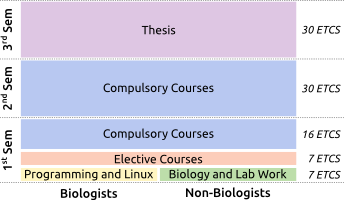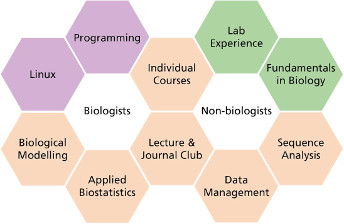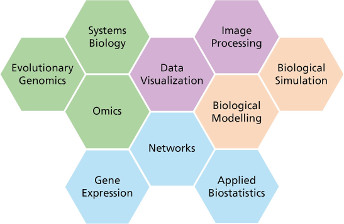Master of Science in Bioinformatics
It took 13 years and 3 billion dollars to decipher the human genome. Today, sequencing a whole genome takes but a few hours on a machine that fits on a tabletop at a tiny fraction of the original costs. Similar technological revolutions are underway in biological imaging, mass spectrometry based proteomics and metabolomics, or ecological remote sensing, just to name a few. Consequently, biological and medical sciences are now collecting enormous amounts of information with the goal to describe and understand how cells, complex organisms or entire ecosystems function. But this tsunami of data generates new challenges: How can we unearth and retrieve the exciting knowledge hidden in such data? How can we make such massive amounts of data available to the scientific community? A proper analysis of this trove of this data does not only require massive amounts calculation power, but also talented people with knowledge in both biology as well as in computer science and statistics to develop adequate and computationally fast analysis tools.
The Master of Science in Bioinformatics and Computational Biology is an interdisciplinary programme taught exclusively in English and jointly organized between the Universites of Fribourg and Bern. All involved departments offer outstanding conditions for research and training and highly competitive researcher-student ratios.
Video Presentation
Link to official study offer
Degree Conferred
Master of Science in Bioinformatics and Computational Biology (BEFRI)
Language(s) of Study
English
Programme Structure
120 ECTS, 4 semesters full time
Programme Start
September
Student Advisor
Prof. Daniel Wegmann
bio-scimed@unifr.ch
Additional Information
RegulationsStudy Plans
-
The curriculum at a glance
The programme requires 90 ECTS credits from courses, followed by a 6 months MSc research project that culminates in a written thesis (30 ECTS). Full time students can complete the programme in
4 semesters.The first semester offers courses specially designed to complement your existing knowledge: an introduction to programming and Linux (7.5ECTS) for people with a background in biology or life science, and an introduction to the fundamentals of biology and lab work (7.5 ECTS) for those with a background in computer science, mathematics, statistics or a related field.

-
Description per semester
1st Semester (Fall) | 30 ECTS
Students with a BSc in biology or life sciences will learn applied programming and the use of Linux from the experts (7.5 ECTS). Similarly, students with a non-biology scientific BSc will have hands-on experience in state-of-the-art biological methods and learn the essential aspects of biology (7.5 ECTS). Students further complement their background with elective courses (8 ECTS) tailored to their needs.
Both groups of students will then follow the same set courses introducing statistical and computational tools fundamental to bioinformatics and get their first experience in analysing big data from large scale sequencing or systems biology projects.
2nd (Spring) and 3rd (Fall) Semester | 30 ECTS each
The following two semesters provide in-depth training in the latest statistical approaches and machine learning, and provide training in the analysis of big data from the entire breadth of the life sciences, including genomics, personalized medicine, proteomics and metabolomics. To gain more hands-on experience, students will further complete a semester project (7.5 ECTS).


4th Semester (Spring)
Each student works on an individual research thesis in one of the research groups at either the University of Fribourg or the University of Bern, thus specializing in a chosen area. The master thesis can also be carried out in collaboration with one of the affiliated institutes, e.g. the Swiss Institute of Bioinformatics (SIB). Governmental and corporate institutions will also be considered as hosts. -
Admission
Master's degree programmes are built on the knowledge and abilities that were acquired when obtaining a Bachelor's degree. Bachelor degrees that allow for a direct admission to the MSc in Bioinformatics and Computational Biology are:
- Bioinformatics
- Biology
- Life Sciences
- Mathematics/Statistics
- Informatics/Computer Science
Graduates from other academic fields (e.g. bioengeneering, pharmacy, physics, etc.) can also apply, but may be requested to make up for missing technical or general knowledge through a complement. This will be judget on an individual basis upon a request for admission
Swiss versus foreign degrees
Holders of a Bachelor's degree awarded from a Swiss university in one of the above mentioned fields can be admitted to a Master's degree programme within Switzerland without any additional requirements.
The same applies to holders of a Bachelor's degree awarded by a foreign university, provided that the Bachelor's degree is recognized and considered equivalent by the University of Fribourg. This is true for most European universities as well as many universities from around the world. If a degree is not recognized as equivalent to a Swiss degree, a comlement may be requested to make up for missing technical or general knowledge. Equivalency will be judged on an individual basis upon a request for admission
Degrees from Universities of applied sciences
MSc in Bioinformatics and Computational Biology is open to holders of a bachelor degree awarded from a university of applied sciences, but a complement of 40 - 60 ECTS will be requested to make up for missing technical or general knowledge. To maximize the benefit for the students, the required complement will be individually tailored upon a request for admission
More information/Admission
Please refer to the admission services for detailed information regarding the admission procedure.
-
Learning objectives and career opportunities
Our Master programme in Bioinformatics and Computational Biology will trim you fit for a career in the life sciences, health science or in food technology, both in industry or in governmental or non-governmental organizations, as well as for a PhD in academia. Bioinformatics and computational biology have direct and highly sought applications in basic and applied research ranging from conservation biology and modeling molecular networks to epidemiology, biomedical engineering and drug design, artistic data visualization and developing human-computer interaction. Our programme further promotes the exchange and interaction with people from many different fields, which will considerably widen your job prospects in academia as well as in the private sector.
-
Important Information for matriculated students
BeNeFri
This study programme is a collaboration between the Universities of Bern and Fribourg. As such, students have to inscribe to the BeNeFri programme to access courses at the institution different form their home university. Information about the registration can be found at the BeNeFri website (for Fribourg Students) or the Admissions Office (for Bern Students). For BeNeFri to remain valid, you need to re-register every semester!Transferring grades
Prior to graduation, you will need to transfer your grades from your guest to your home university. To transfer grades from KSL (University of Bern) to the University of Fribourg, send a request to info@natdek.unibe.ch at the Dean's Office of the Faculty of Science of the University of Bern. After obtaining the transcript, contact the bio-scimed@unifr.ch to enter the grades.Master thesis
A master thesis should last for six months full time work (excluding holidays, course work etc.) and must be conducted at in accepted laboratory. A list of these along with potential topics will be distributed in due time.
Once you've started your master thesis, you will need to fill in and return the master thesis start form within three weeks.
Once you've completed your master thesis, you will need to submit it at your home university, irrespective of where you conducted your project. Please see the checklist for details on the procedure.Additional Info
Please also consult the information page at the University of Bern.
